Introduction
Ecommerce AI chatbots are revolutionizing the way businesses interact with customers online. Businesses use Ecommerce AI chatbots for instant, personalized customer support.
It enhances their overall customer experience. In the fast-paced world of ecommerce customers expect quick and efficient service.
Thus, commerce AI chatbots have become essential tools. They help answer queries, guide users through purchasing, and make personalized product recommendations.
It is based on user preferences and behavior. Ecommerce AI chatbots ensure customers receive timely assistance, increasing satisfaction and loyalty. Moreover, they operate 24/7, providing round-the-clock service without human intervention.
This guide will explore what Ecommerce AI chatbots are, how they work, and their benefits. Also, we will explore some ecommerce chatbot use cases and real-life examples of companies successfully using them.
What are AI Chatbots for Ecommerce?
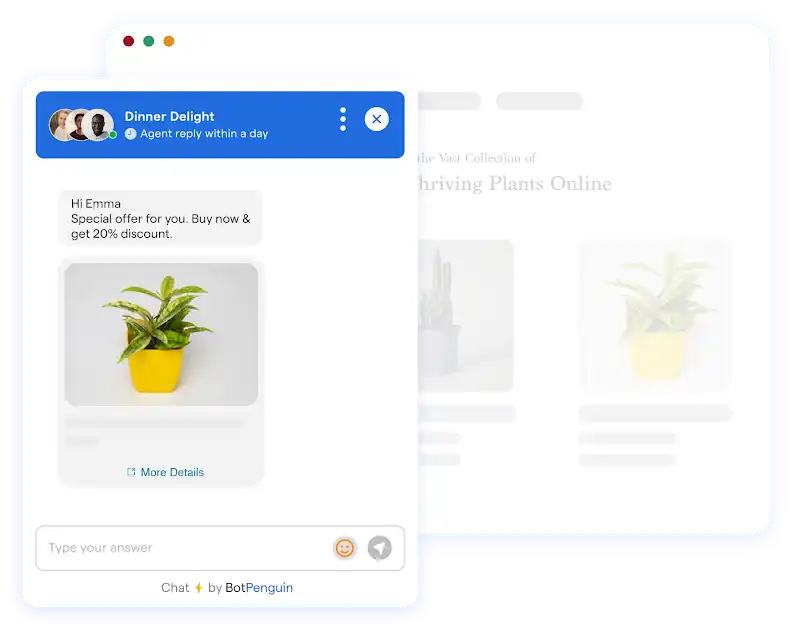
AI chatbots for ecommerce use natural language processing (NLP) and machine learning.
It helps to understand and respond to customer queries effectively. They simulate human-like conversations, essential for online businesses to enhance customer experience.
Ecommerce AI chatbots can provide instant answers to FAQs
It can recommend products to users from the catalog based on their preferences and purchasing history.
Customers can place, modify, and cancel their orders or even make secure payments using an ecommerce AI chatbot.
Businesses can inform their customers about ongoing offers, coupons, and festive campaigns using an ecommerce AI chatbot.
How do Ecommerce AI Chatbots Work?
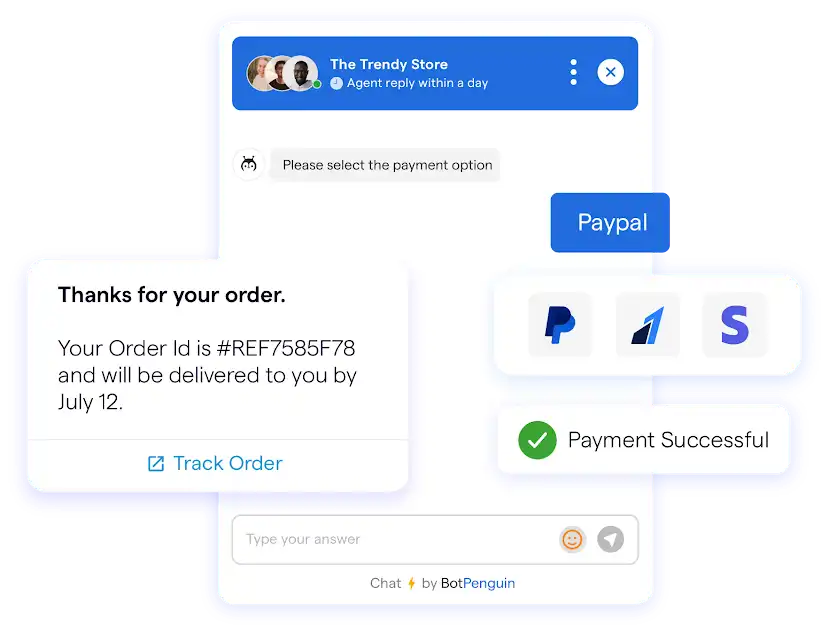
Ecommerce AI chatbots utilize NLP to understand the intent behind customer messages, ensure proper responses, analyze text inputs, recognize patterns, and extract relevant information.
This lets them give accurate responses quickly. Ecommerce AI chatbots keep on learning from interactions, improving their responses over time.
It integrates with various data sources and backend systems. Ecommerce AI chatbots access product information, inventory status, and order details, boosting customer service efficiency.
Benefits of AI Chatbots for Ecommerce
There are plenty of benefits a business can derive from an ecommerce AI chatbot. Here are some of its major benefits:
Improved Customer Service
Ecommerce AI chatbots play a crucial role in enhancing customer service. They are available 24/7 to address customer inquiries promptly and efficiently.
It ensures quicker response to customer queries. It leads to higher satisfaction levels and a better overall shopping experience.
24/7 Availability
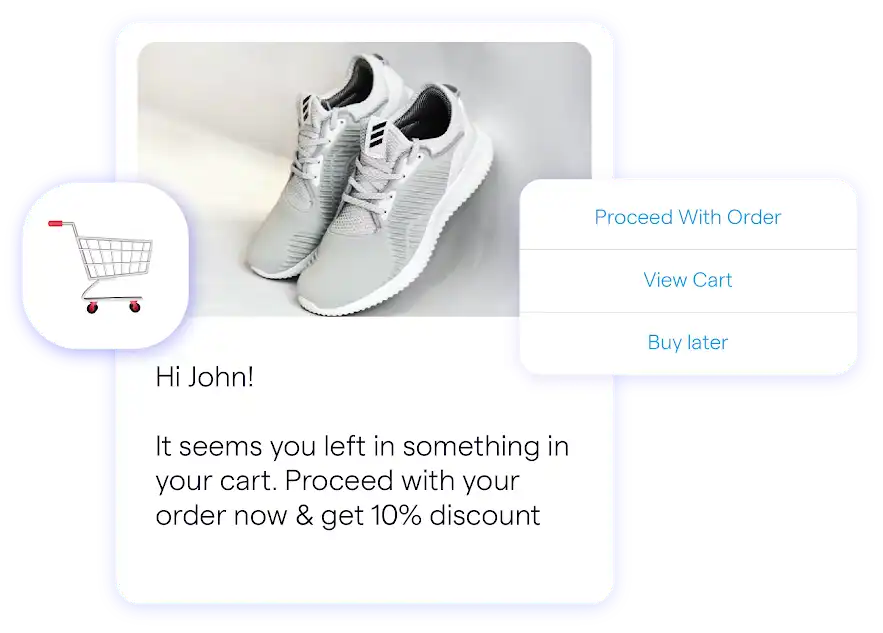
A key advantage of AI chatbots for ecommerce is their round-the-clock availability.
They differ from human customer support. With no limit on working hours, ecommerce AI chatbots can assist customers anytime.
This ensures customers get help when they need it. It makes buying easier and more likely.
Personalization
AI chatbots for ecommerce have advanced algorithms. They use them to personalize interactions with customers.
Chatbots can offer tailored product recommendations and deals by analyzing customer data and past behavior.
This enhances the customer experience and builds a stronger connection between the customer and the brand.
Cost Savings
Implementing AI chatbots for ecommerce can lead to significant cost savings for businesses.
AI chatbots for ecommerce can handle many customer inquiries at once. This reduces the need for a large customer service team.
This cuts down on operating costs and allows businesses to allocate resources more efficiently.
Increased Sales
Ecommerce AI chatbots can drive sales by guiding customers through the purchasing process.
They can recommend products based on customer preferences. They offer discounts or promotions and help with completing transactions.
AI chatbots for ecommerce can help by simplifying shopping and offering personalized recommendations. They can increase conversion rates and boost sales.
Key Features of Ecommerce AI Chatbots
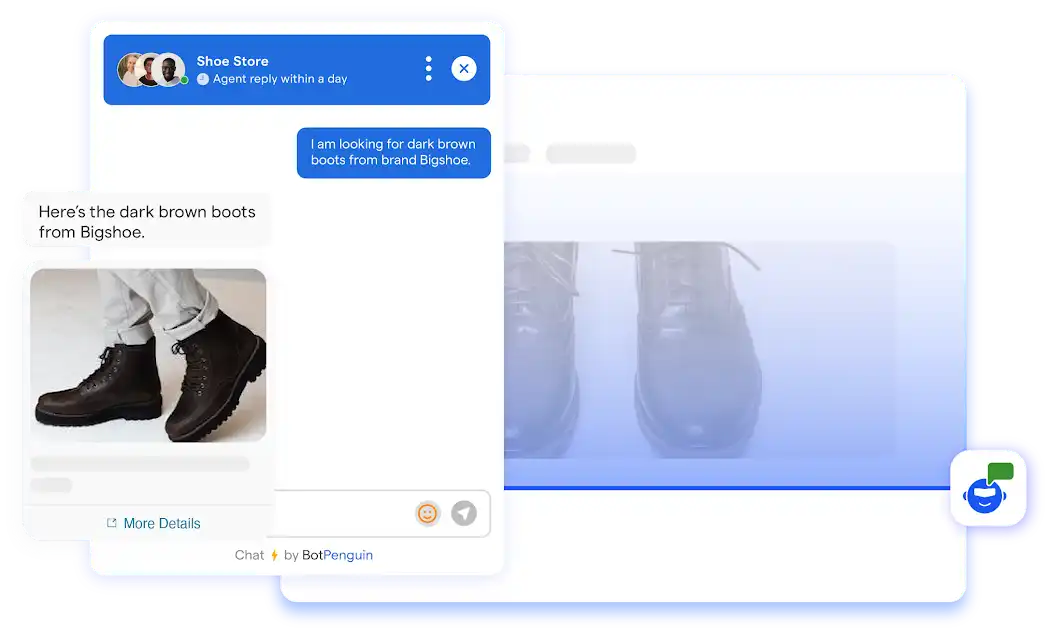
Ecommerce AI chatbots come with a wide range of features, making it easier for businesses to adapt them to their diverse needs. Here are some of its key features -
Natural Language Processing (NLP)
Ecommerce AI chatbots have Natural Language Processing (NLP). They can understand human language.
This technology allows AI chatbots for ecommerce to chat with customers seamlessly. They provide personalized help and guide users as they shop.
Machine Learning Capabilities
AI chatbots for ecommerce are powered by machine learning algorithms. These let the chatbots continuously learn and improve over time.
By analyzing user interactions and feedback, AI chatbots for ecommerce can improve their replies.
They can also make better recommendations and predict customer needs. This feature ensures that the AI chatbot for ecommerce can adapt. It can adapt to changing trends and preferences in ecommerce.
Suggested Reading:
11 Best Ways eCommerce Chatbots Can Boost Lead Generation!
Integration with CRMs, Help Desk, and Marketing Tools
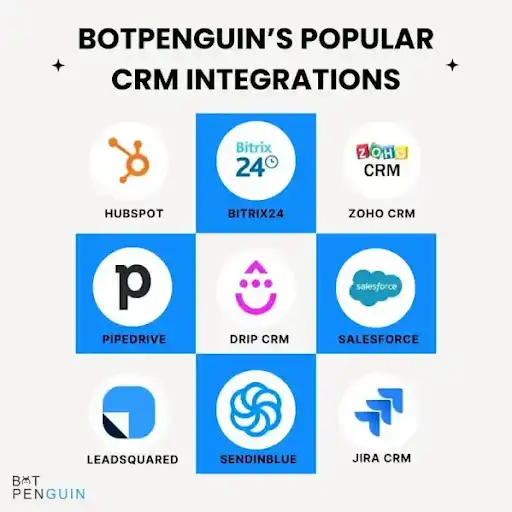
Ecommerce AI chatbots can integrate with a wide range of CRMs, Help desks, and online marketing tools.
It allows you to handle all the conversations and activities on different platforms through a single chatbot.
It also reduces the manpower required to handle customer queries across various platforms.
Order Tracking and Management
One of the key features of ecommerce AI chatbots is their ability to assist customers in tracking and managing their orders. AI chatbots for ecommerce can give users real-time updates. They cover the status of their purchases.
This includes order confirmation, shipping details, and delivery notifications. Also, chatbots can help customers with returns, exchanges, and refunds. They offer a smooth and quick post-purchase experience.
Customer Data Collection and Analysis
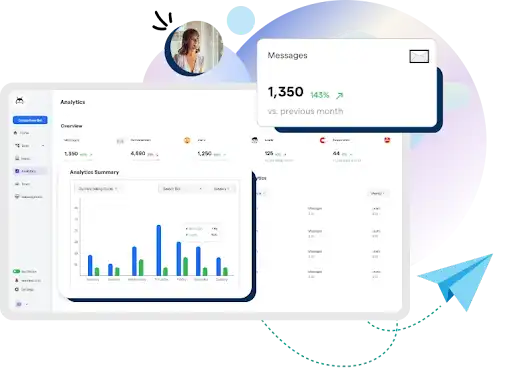
Ecommerce AI chatbots can collect and analyze data, gathering insights from customer interactions.
Chatbots can make personalized product recommendations by analyzing user behavior, preferences, and feedback. They can also create promotions and marketing campaigns tailored to individual shoppers.
It helps businesses enhance customer experience, boost sales, and build customer loyalty. It also ensures that these goals are achieved with comparatively lower human efforts.
Suggested Reading:
7 Ways Ecommerce AI Chatbots Boost Conversion Rates
Real-life Examples of Ecommerce Chatbot Use Cases
Explore how leading brands utilize e-commerce chatbots to enhance customer engagement, satisfaction, and sales through personalized, interactive experiences.
Sephora

Sephora's ecommerce AI chatbot helps customers. It finds the perfect beauty products for them based on their preferences.
The AI chatbot for ecommerce can give personalized recommendations. This feature improves shopping for customers.
It increases satisfaction and loyalty. For Sephora, the AI chatbot for ecommerce boosts customer engagement. It also improves conversion rates and, in the end, drives sales.
H&M
H&M's ecommerce AI chatbot serves as a virtual stylist for shoppers. It offers guidance on clothing items, suggests outfit combinations, and gives fashion tips. The AI chatbot for ecommerce improves shopping.
It does this by creating a personalized and interactive space for customers. As a result, customers feel more engaged with the brand. This leads to higher satisfaction and more repeat purchases.
It leads to higher conversion rates and better customer service. It also strengthens the brand's image.
Domino’s Pizza
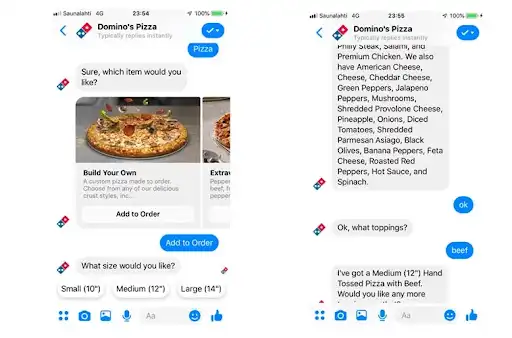
Domino’s Pizza integrates an AI chatbot for ecommerce into their ordering system to streamline the process for customers.
The AI chatbot for ecommerce allows users to easily place orders, track deliveries, and resolve any queries.
Domino's offers a fast and easy way for customers to interact with the brand. This enhances customer convenience and satisfaction.
From a business view, the AI chatbot for ecommerce improves order accuracy. It also cuts wait times and boosts efficiency.
Nike
Nike uses an ecommerce AI chatbot. It gives customers personalized product recommendations and sizing help. It also gives them updates on new releases.
The AI chatbot for ecommerce gives tailored suggestions. It also assists.
This boosts customer engagement and leads to more brand loyalty. Nike uses the AI chatbot for ecommerce. It provides valuable insights into customer preferences and behaviors.
This lets the brand offer a more personalized shopping experience focused on the customer.
eBay

eBay's ecommerce AI chatbot helps users. It helps them search for products, place bids, and manage purchases well.
The AI chatbot for ecommerce provides instant access to information and support. It improves the shopping experience for customers.
This leads to more user engagement. It also leads to higher satisfaction and smoother customer interactions for eBay.
The AI chatbot for ecommerce improves the brand's image. It also helps keep more customers.
Walmart
Walmart's AI chatbot for ecommerce is designed to help customers. It can assist with product questions, order tracking, and saving info in real time. The chatbot offers instant help. It resolves customer issues quickly.
This makes customers more satisfied and loyal. From a business view, Walmart gains from better customer service. It means faster problem-solving and efficiency.
The AI chatbot for ecommerce is a valuable tool. It enhances the shopping experience for Walmart customers.
How to Implement an AI Chatbot for Ecommerce?

Ecommerce is always changing. AI chatbots for ecommerce have emerged as powerful tools in it. They enhance customer experiences and streamline business operations.
Adding an AI chatbot for ecommerce in your ecommerce setting can seem hard at first. But, with the right approach, it can bring big benefits.
Below is a step-by-step guide on setting up, training, and integrating an AI chatbot for ecommerce.
Define Chatbot Goals and Functions
Start by clearly stating the purpose of your ecommerce AI chatbot. Identify the key tasks it should perform.
These include answering customer queries, recommending products, and assisting with transactions.
This will help guide the development process and ensure that the chatbot aligns with your business goals.
Choose a Good Platform for Chatbot Development

Pick one that fits your technical needs and budget. Many chatbot development tools are available. They range from DIY platforms to custom solutions.
Consider factors when choosing a platform for your ecommerce AI chatbot. These include scalability, integration, and ease of use.
Train the Chatbot with Relevant Data and Scenarios
This helps its ecommerce effectiveness. Provide it with a dataset of customer queries, product information, and conversation scenarios to learn from.
Use NLP to help the chatbot understand user inputs and respond accurately.
The Chatbot must work with Existing Platforms
It should connect well with your ecommerce platform, CRM system, and other relevant tools.
This integration will enable the chatbot to access real-time data, provide personalized recommendations, and automate routine tasks like order processing.
Suggested Reading:
Comparing the Top 7 eCommerce Chatbot Platforms
Test the Chatbot well. Make it Faster
Do thorough testing to find and fix any issues. Do this before launching your AI chatbot for ecommerce. Test the chatbot's responses and logic flow.
Test its integration with external systems to ensure a smooth user experience. Continuously monitor the chatbot's performance. Improve it based on user feedback and data insights.
Follow these steps. You can implement an AI chatbot in your ecommerce setting. It will improve customer interactions, efficiency, and business growth.
Challenges and Limitations
Besides having so many advantages, ecommerce AI chatbots also have some challenges and limitations. Here are some of those challenges and how to overcome them -
Initial Setup Costs
Implementing an AI chatbot in ecommerce comes with some initial setup costs that can be quite significant.
These costs include making the chatbot, connecting it to existing systems, and training it to understand and answer customer questions.
To address this challenge, you must budget and plan for these setup costs carefully. This is key to a successful implementation.
Need for Continuous Improvement
One of the key challenges of using AI chatbots in ecommerce is the need for continuous improvement. Customer needs and preferences are constantly evolving, as are AI technologies.
This means that your chatbot needs regular updates and improvements to stay relevant and effective. To meet this challenge, you need a team to monitor the chatbot.
They will gather user feedback and make needed changes to improve it.
Handling Complex Queries
Another challenge that companies face when using AI chatbots in ecommerce is handling complex queries.
Chatbots are great at answering common questions. But, they may struggle with intricate or uncommon ones.
Ensuring Data Privacy
When using AI chatbots for ecommerce, protecting data is key. Customers expect their information to be safe.
To achieve this, strong security measures are crucial. Encryption and secure storage methods keep customer data safe.
Firms must also be clear about data use. Compliance with regulations builds trust.
Top Ecommerce Chatbot Use Cases
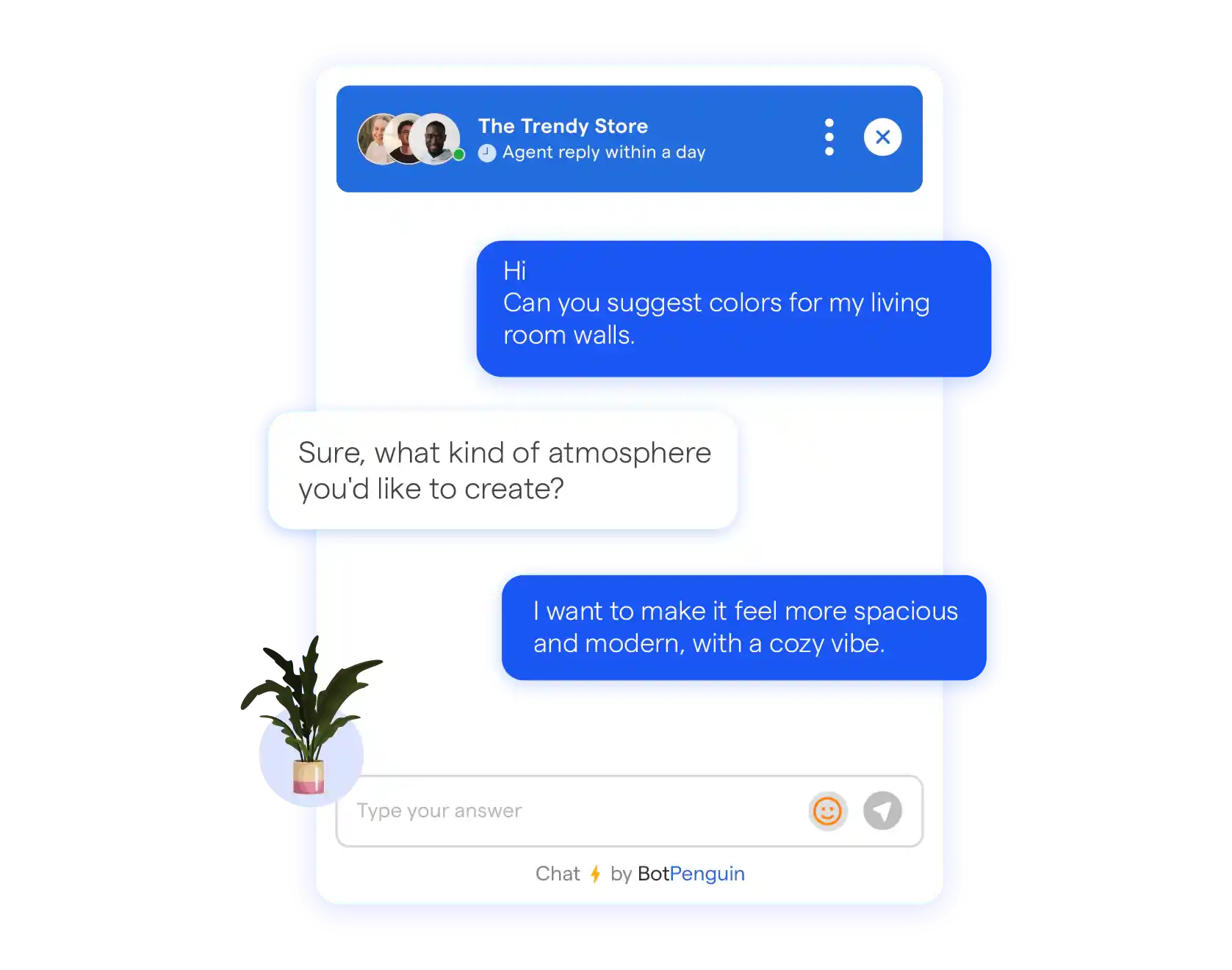
You can Ecommerce AI chatbots for accomplishing various activities which can be better automated for efficiency. Below listed are some basic ecommerce chatbot use cases:
Virtual Styling: AI chatbots offer fashion advice and outfit suggestions, creating an engaging shopping experience.
Product Search Assistance: Chatbots help users find specific products quickly by navigating through the catalog, improving user experience.
Cart Abandonment Recovery: Chatbots remind customers about their abandoned carts and offer incentives to complete the purchase.
Feedback Collection: Chatbots gather customer feedback post-purchase, providing valuable insights for business improvements.
Inventory Management: Chatbots update customers on product availability and back-in-stock notifications, ensuring they are well-informed.
Multilingual Support: Chatbots offer customer service in multiple languages, catering to a global audience and improving accessibility.
So, these are the eCommerce chatbot use cases we commonly encounter while shopping. Each use case provides tremendous value to the users and improves their shopping experience.
Conclusion
Ecommerce AI chatbots are now vital for online businesses. They offer quick, personalized customer support 24/7. These smart assistants smooth customer interactions.
They also enhance the shopping experience by suggesting products and quickly answering questions.
Using AI chatbots, businesses can boost customer satisfaction and sales and cut costs. Many companies, like Sephora, H&M, and Nike, adopt this technology to stay competitive.
The currently applicable eCommerce chatbot use cases and potential ones hint towards a future of wholly automated online shopping.
AI is advancing, making chatbots smarter. Not using AI chatbots is no longer an option. It's a necessity to thrive in the digital age.
As technology evolves, AI chatbots for ecommerce will play a bigger role. They will drive innovation and improve customer engagement.
Suggested Reading:
10 ways E-commerce chatbots are changing the way we shop
Frequently Asked Questions (FAQs)
What is an Ecommerce AI Chatbot?
An Ecommerce AI chatbot is a virtual assistant. It uses artificial intelligence to talk to customers on e-commerce platforms. It answers queries, helps with purchases, and gives personalized recommendations.
How does an Ecommerce AI Chatbot benefit online stores?
Ecommerce AI chatbots enhance the customer experience. They provide instant support, improve engagement, and boost sales through personalized suggestions. They also streamline order processes, thus increasing efficiency.'
Can an Ecommerce AI Chatbot handle multiple languages?
Yes, many Ecommerce AI chatbots can speak many languages. They use this ability to talk to customers in various languages. This broadens the store's reach.
Are Ecommerce AI Chatbots customizable?
Ecommerce AI chatbots can match the brand’s voice, look, and feel. They ensure a consistent customer experience across all interactions.
What are some examples of Ecommerce AI Chatbots?
Examples of ecommerce AI chatbots include AI ChatBots for ecommerce by LiveChat, BotPenguin, and Tidio. They offer strong AI-driven tools to improve customer interactions on e-commerce platforms.
Do Ecommerce AI Chatbots integrate with other tools?
Yes, ecommerce AI chatbots often connect to CRM systems, payment gateways, and marketing platforms. They do this to offer a smooth and efficient customer service experience.
What are the top ecommerce chatbot use cases?
The common ecommerce chatbot use cases include personalized recommendations, order tracking, customer support, virtual styling, automated payments, promotional campaigns, and feedback collection.


